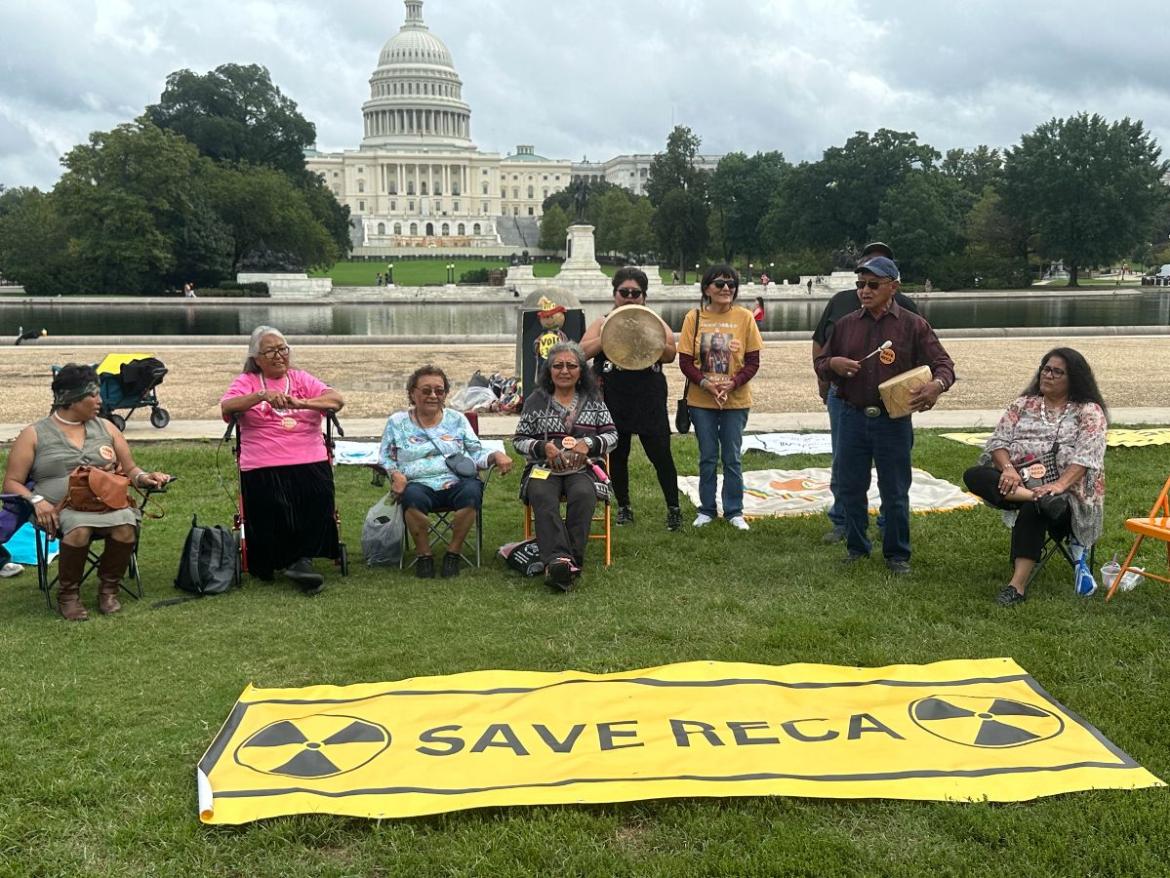They marched to the Capitol in the rain. Many held signs. Some pushed loved ones in wheelchairs. Others carried photos of those they’ve lost. All of them carried pain caused by radiation exposure.
They were “downwinders” – a group of Native advocates who are among thousands harmed by our government’s nuclear weapons program. Many were elders. Some are sick. Some are dying. Yet still, they took a grueling 37-hour bus trip from New Mexico this week to deliver one message: “Save RECA now!”
The Radiation Exposure Compensation Act (RECA) provided life-saving support for survivors. Some were exposed directly as children who lived “down wind” of a nuclear test site or while mining the uranium that built the bombs. Tragically, the resulting sicknesses have persisted for generations.
In March, the Senate overwhelmingly passed bipartisan legislation to extend RECA and expand compensation to thousands who were excluded. Shamefully, the House has failed to finish the job. As of June, RECA has officially expired.
After marching to the Capitol Tuesday, the downwinders held a press conference with a bipartisan group of lawmakers to spur Speaker Mike Johnson to act.
“I’m barely surviving,” said Fred Vallo, a Vietnam war veteran suffering from cancer.
“This bill won’t bring our people back,” he said, sharing about his loved ones and neighbors who died from radiation-related cancer. “It’s for our kids … it’s for our grand kids.”
Thankfully, there’s reason for hope. Sen. Josh Hawley (MO), who led the bill in the Senate, shared that a deal with Johnson on this legislation could be within reach.
“There are a lot of things in this world that you cannot fix,” said Dawn Chapman, a mother of a child sickened by nuclear contamination in Missouri. “This one can be fixed.”
All that’s needed is for House members to make downwinder communities a priority. You can help: urge your representative to ensure our government doesn’t turn their back on them.
Elsewhere
Escalation in Lebanon
Israel appears to be inching closer to a ground invasion of Lebanon. Israel’s bombs killed hundreds of people in Lebanon just this past week.
A broader conflict isn’t in anyone’s interest. In July, FCNL’s Hassan El-Tayyab warned that the U.S. must act urgently to prevent a catastrophic regional war.
Now, we’re closer to war than ever. There’s still time to stop it. But U.S. leaders must use their leverage.
That means stopping the flow of U.S. weapons that are fueling this escalation and killing civilians. A new resolution introduced this week by Senator Bernie Sanders (VT) would block arms shipments slated to go to Israel. Congress must pass this resolution and do everything it can to de-escalate the situation in Lebanon and bring permanent ceasefire in Gaza.
Honoring Survivors of Indian Boarding Schools
Monday, September 30, is Orange Shirt Day. On this day, Native communities and allies honor and remember the survivors of Indian Boarding Schools, as well as those who never returned home.
The Orange Shirt Day movement was begun by Phyllis Webstad (Northern Secwépemc) whose new shirt was taken from her on her first day at boarding school. Her story of resilience in the face of attempted assimilation speaks to the courage of so many Native children.
Orange Shirt Day is a day of advocacy for truth and healing. FCNL’s Bridget Moix wrote in RNS about the need for action. Do your part to call on Congress to do justice!
We’re hiring!
We are hiring a full-time Advocacy Team Organizer to support and train new and prospective members of FCNL’s Advocacy Teams, connecting them with the national network of 1,400 people already working in 135 teams around the country.
FCNL’s Witness for Peace
- We joined a letter this past week asking President Biden to lead the U.S. in the abolition of cluster munitions – not be complicit in their manufacture and use.
- In an op-ed in the Hill, FCNL’s Hassan El-Tayyab urged Congress to restore vital humanitarian funding for Gaza. Learn more and urge your reps to support the UNRWA Emergency Restoration Act (H.R. 9649).



